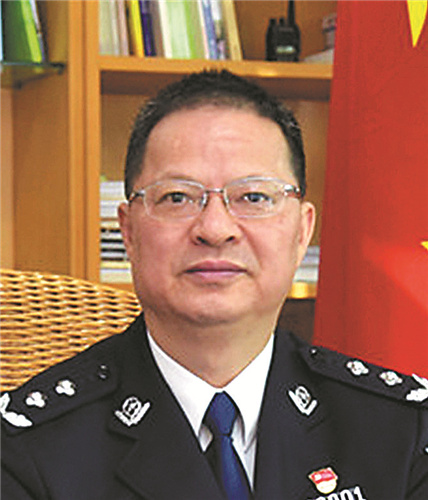

Pan Dongsheng, vice-mayor and head of the public security bureau of Fuzhou, Fujian province, died in the line of duty on Sept 25 at the age of 57.
Hearing the sad news, Fuzhou residents left messages online to pay homage to him. One of the messages reads: "He was a conscientious civil servant, who worked for the people. We will forever remember the leader who has the people in his heart."
Pan was head of the public security bureaus of Sanming and Fuzhou. During his tenure, he introduced a range of digital measures, to promote online access to public services, relieve traffic pressure and reduce crime.
Whenever misfortune and disasters struck, be it a mudslide in Sanming, an inferno in Fuzhou, or when tropical storm Nepartak hit the province, he always rushed to the front line with rescue teams.
In the early morning of May 8,2016, a mudslide triggered by days of heavy rain, wreaked havoc on Chitan village in Sanming's Taining county, trapping dozens of workers underneath a hydropower station's construction shed.
Upon being informed of the emergency at 5:30 am, Pan immediately rushed to the scene, mobilized police forces and provided traffic control for rescue vehicles. Rescue efforts lasted five days, during which he worked side by side with members of the search teams and police.
A week prior to his sudden death, he was still toiling away at work, from pandemic control and prevention, public security at scenic spots and major events, to extending Mid-Autumn Festival greetings to police officers and medical workers.
He set his mind on serving the public when studying computer programming at Fuzhou University. Despite his outstanding academic performance that promised a profitable career, he chose to join the police force.
"The Communist Party of China nurtured me. The police is a noble profession that works for the people and protects public security. And I want to join this honorable team," Pan once said.
To his colleagues, Pan was a strict and impartial leader at work, but he also showed warmth and care to the welfare of the police officers, giving his word in providing "a warm home for everyone".
When he started working in Sanming in 2014, he investigated the police stations in the city and learned that, among the 96 sites, more than half were built in the 1970s or '80s and had less than adequate working and living facilities.
He immediately started a project to improve work conditions, upgrade the infrastructure of the police stations and dormitories, as well as guaranteeing the job security and welfare for the local police officers.
Pan brought similar practices to Fuzhou. Observing that many police officers were working in different cities away from their family members, he started a points-based transfer system that evaluated the applicant's personal situation and work performance, so that the police officers can apply to transfer to a posting closer to their families.
Zheng Hua, deputy head of the Chating police station in Fuzhou, is a beneficiary of the system. For 15 years, he worked at the public security bureau of Minqing, a county of Fuzhou, while his wife, parents and two children lived downtown. After Pan launched the system, Zheng applied and was transferred to urban Fuzhou. After learning about Pan's passing, Zheng said: "It was thanks to him that my family could be reunited, and I haven't even had the chance to express my gratitude to him."
HU MEIDONG in Fuzhou